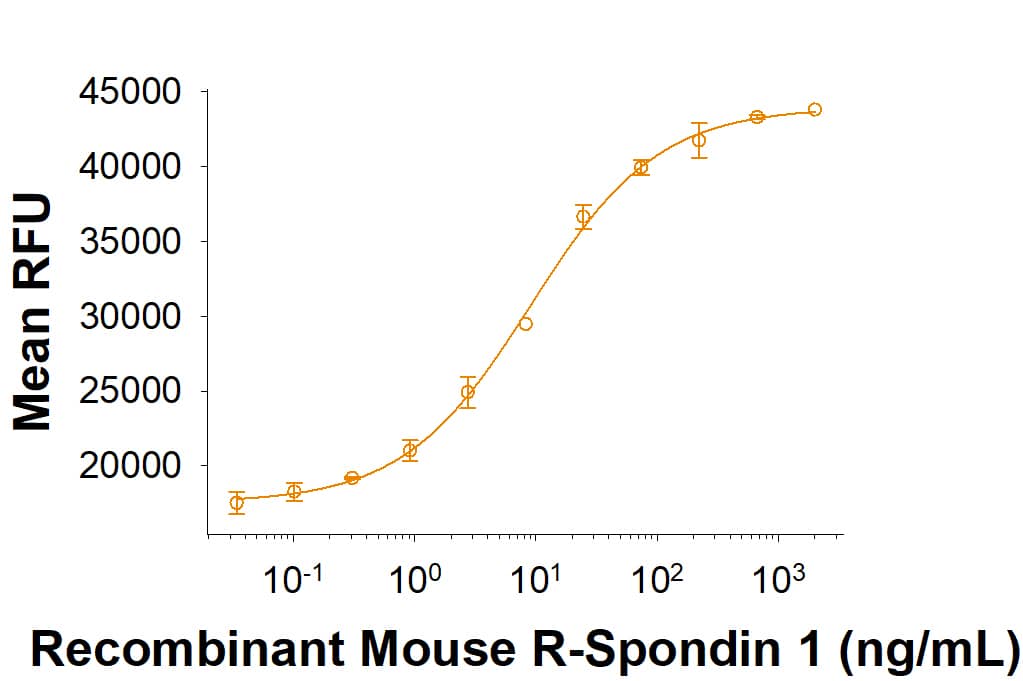Recombinant Mouse R-Spondin 1 (CHO-expressed) Protein Best Seller
R&D Systems, part of Bio-Techne | Catalog # 7150-RS

Key Product Details
Product Specifications
Source
Met1-Gln265
Purity
Endotoxin Level
N-terminal Sequence Analysis
Predicted Molecular Mass
SDS-PAGE
Activity
The typical ED50 is 8-40 ng/mL in the presence of 5 ng/mL Recombinant Mouse Wnt‑3a (Catalog # 1324-WN).
Reviewed Applications
Read 3 reviews rated 4.7 using 7150-RS in the following applications:
Scientific Data Images for Recombinant Mouse R-Spondin 1 (CHO-expressed) Protein
Recombinant Mouse R-Spondin 1 (CHO-expressed) Protein Bioactivity
Measured by its ability to induce Topflash reporter activity in HEK293T human embryonic kidney cells. The typical ED50 is 8-40 ng/mL in the presence of 5 ng/mL Recombinant Mouse Wnt‑3a (1324-WN).Formulation, Preparation and Storage
Carrier Free
What does CF mean?CF stands for Carrier Free (CF). We typically add Bovine Serum Albumin (BSA) as a carrier protein to our recombinant proteins. Adding a carrier protein enhances protein stability, increases shelf-life, and allows the recombinant protein to be stored at a more dilute concentration. The carrier free version does not contain BSA.
What formulation is right for me?In general, we advise purchasing the recombinant protein with BSA for use in cell or tissue culture, or as an ELISA standard. In contrast, the carrier free protein is recommended for applications, in which the presence of BSA could interfere.
Carrier: 7150-RS
| Formulation | Lyophilized from a 0.2 μm filtered solution in PBS with BSA as a carrier protein. |
| Reconstitution | Reconstitute at 100 μg/mL in PBS containing at least 0.1% human or bovine serum albumin. |
| Shipping | The product is shipped at ambient temperature. Upon receipt, store it immediately at the temperature recommended below. |
| Stability & Storage | Use a manual defrost freezer and avoid repeated freeze-thaw cycles.
|
Carrier Free: 7150-RS/CF
| Formulation | Lyophilized from a 0.2 μm filtered solution in PBS. |
| Reconstitution | Reconstitute at 100 μg/mL in PBS. |
| Shipping | The product is shipped at ambient temperature. Upon receipt, store it immediately at the temperature recommended below. |
| Stability & Storage | Use a manual defrost freezer and avoid repeated freeze-thaw cycles.
|
Background: R-Spondin 1
Structurally similar to other R-Spondins, R-Spondin 1 contains two adjacent cysteine-rich furin-like domains (aa 34-135) with one potential N-glycosylation site, followed by a thrombospondin (TSP-1) motif (aa 147-207) and a region rich in basic residues (aa 211-263). Only the furin-like domains are needed for beta-catenin stabilization (2, 12). A putative nuclear localization signal at the C-terminus may allow some expression in the nucleus (13). Mouse R‑Spondin 1 shares 98%, 94%, 94%, 93%, 92% and 88% aa identity with rat, human, horse, cow, goat and dog RSPO-1, respectively, within aa 21‑209.
References
- Chen, J.-Z. et al. (2002) Mol. Biol. Rep. 29:287.
- Kim, K.-A. et al. (2006) Cell Cycle 5:23.
- Nam, J.-S. et al. (2007) Gene Expr. Patterns 7:306.
- Binnerts, M.E. et al. (2007) Proc. Natl. Acad. Sci. USA 104:14700.
- Nam, J.-S. et al. (2006) J. Biol. Chem. 281:13247.
- Wei, Q. et al. (2007) J. Biol. Chem. 282:15903.
- Kamata, T. et al. (2004) Biochim. Biophys. Acta 1676:51.
- Parma, P. et al. (2006) Nat. Genet. 38:1304.
- Kim, K.-A. et al. (2005) Science 309:1256.
- Zhao, J. et al. (2007) Gastroenterology 132:1331.
- Drost and Clevers. (2018) Nature Reviews Cancer 18:407.
- Kazanskaya, O. et al. (2004) Dev. Cell 7:525.
- Tomaselli, S. et al. (2008) Hum. Mutat. 29:220.
Long Name
Alternate Names
Gene Symbol
UniProt
Additional R-Spondin 1 Products
Product Documents for Recombinant Mouse R-Spondin 1 (CHO-expressed) Protein
Product Specific Notices for Recombinant Mouse R-Spondin 1 (CHO-expressed) Protein
For research use only
